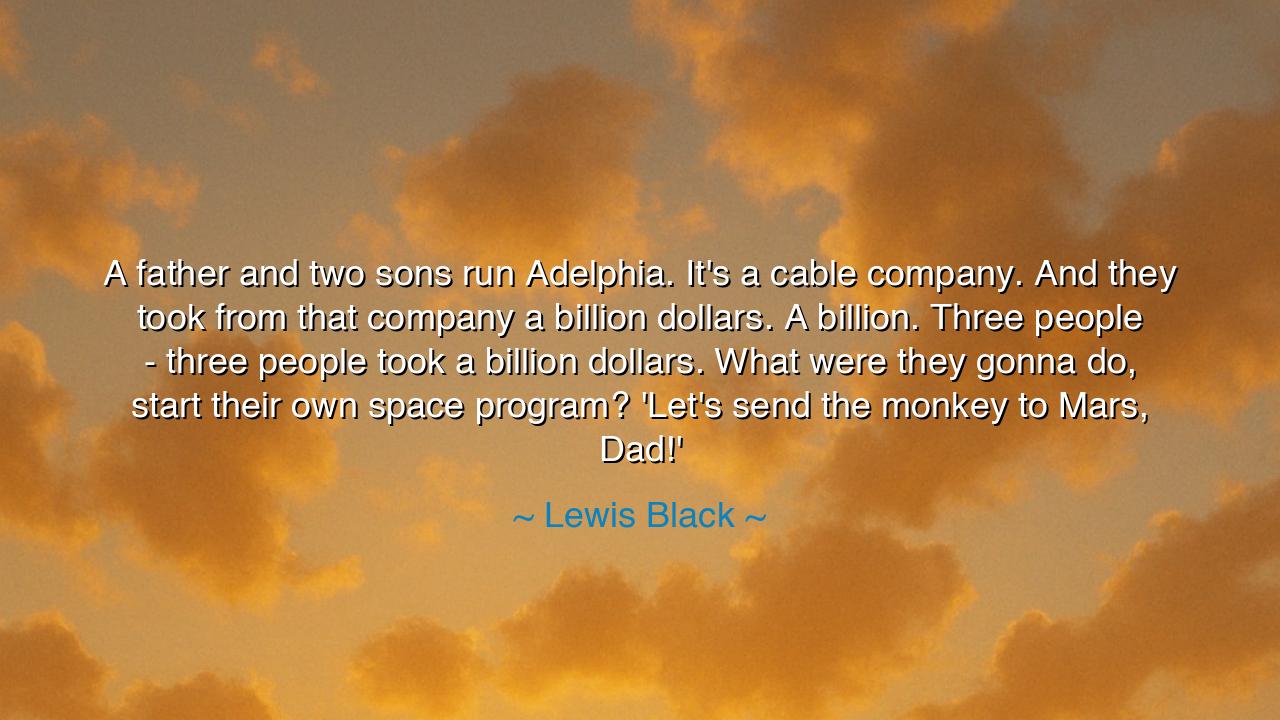
A father and two sons run Adelphia. It's a cable company. And
A father and two sons run Adelphia. It's a cable company. And they took from that company a billion dollars. A billion. Three people - three people took a billion dollars. What were they gonna do, start their own space program? 'Let's send the monkey to Mars, Dad!'






"A father and two sons run Adelphia. It's a cable company. And they took from that company a billion dollars. A billion. Three people — three people took a billion dollars. What were they gonna do, start their own space program? 'Let's send the monkey to Mars, Dad!'" Thus spoke Lewis Black, the modern jester and philosopher of fury, his words dripping with both laughter and lament. Beneath the comedy of his outrage lies a truth both ancient and eternal — the madness of greed, the blindness of power, and the tragic folly of those who mistake wealth for worth. His voice, though framed in jest, is the cry of a moral prophet standing in a marketplace of excess, asking mankind: How much is enough?
In this fiery utterance, Black refers to the Adelphia Communications scandal of the early 2000s, in which John Rigas and his sons — founders of one of America’s largest cable companies — were found guilty of looting their own creation. They siphoned nearly a billion dollars from their company for personal luxuries: lavish homes, private jets, extravagant ventures that fed their vanity more than their need. Black, with his signature wit, transforms this moral catastrophe into absurd comedy, mocking the scale of their greed — “What were they gonna do, start their own space program?” Yet, through humor, he reveals something tragic: that human desire, once ungoverned, knows no bounds.
To the ancients, this would have been no surprise. The philosophers of Greece and Rome warned that avarice — the insatiable hunger for more — is a sickness of the soul. Seneca called it the greatest of all poverty, for the man who has everything but desires more is poorer than the beggar who is content. Aristotle taught that wealth is only a means to virtue, never an end in itself. But in every age, men forget. Like the Rigases, they build empires, not from love or service, but from self, and in doing so, they sow the seeds of their own ruin. For wealth built on dishonor, like a tower on sand, cannot stand.
In mocking the Rigases’ absurd excess, Lewis Black joins a long tradition of truth-tellers cloaked in jest — the court jesters of kings, the satirists of old, who spoke what others feared to say. Through laughter, he exposes the moral decay that hides behind modern success. When he asks, “What were they gonna do, start their own space program?” he does not merely jest about their ridiculous greed; he points to the insanity of limitless desire — the desire that would take food from the mouths of many to feed the ego of a few. His humor is a mirror, reflecting back to society its own distortion.
History is filled with the downfall of such men. Think of Croesus, the ancient king of Lydia, whose wealth was so vast that his name became a symbol for riches. He believed his fortune made him untouchable — until it led him into war and ruin. Or consider the mighty House of Medici, whose power once rivaled that of empires, yet whose own corruption and pride brought about its decay. The same lesson repeats through the ages: when wealth becomes an idol, it devours its worshippers. The Rigases of our time are but echoes of those who fell before them — proof that human folly, like history, repeats itself for those who refuse to learn.
Yet, within Black’s fury and jest lies not only condemnation but warning. He reminds us that greed does not begin with billions — it begins with a thought: I do not have enough. It is a whisper that grows into obsession, until men no longer see others as people, but as instruments of gain. The antidote, then, is not poverty, but perspective — to remember that the value of a man lies not in what he owns, but in what he gives. A fortune that benefits none but the self is not wealth, but waste.
So, my child, take this lesson as both shield and compass: do not worship gold, for gold is a fickle god. Wealth gained dishonorably will never bring peace; it will chain your soul to endless hunger. Be content with enough, and generous with abundance. Build not towers of pride, but foundations of purpose. Let your riches, whether of coin or spirit, serve others, and you shall find joy where others find only emptiness.
For as Lewis Black’s furious humor reminds us, laughter itself can be a teacher — a sharp sword hidden in jest. It cuts through the pretense of success to reveal the truth beneath: that greed is madness, and that greatness is not found in how much one possesses, but in how much one refuses to take. The billion stolen by a few may build mansions, but the humility and honesty of one just soul can build a kingdom that will never fall.






AAdministratorAdministrator
Welcome, honored guests. Please leave a comment, we will respond soon